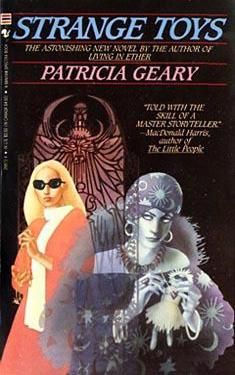Guest Post by Misha Burnett: Strange Toys by Patricia Geary
Monday , 20, June 2016 Appendix X 3 CommentsThrough The Eyes Of A Child: Patricia Geary’s Strange Toys
 You should know by now that I favor fiction that breaks down the walls between genres. Patricia Geary’s Strange Toys doesn’t so much break down the walls as grind them into a fine powder and then snort them from the tanned sculpted chest of the Moroccan pool boy. It was published in 1987, and won the Phillip Dick Award for that year. I suspect that the best way to describe it as a Weird Coming Of Age Tale.
You should know by now that I favor fiction that breaks down the walls between genres. Patricia Geary’s Strange Toys doesn’t so much break down the walls as grind them into a fine powder and then snort them from the tanned sculpted chest of the Moroccan pool boy. It was published in 1987, and won the Phillip Dick Award for that year. I suspect that the best way to describe it as a Weird Coming Of Age Tale.
The first person narrator, Pet, is nine years old when the story begins. She has a profoundly dysfunctional family, which mostly centers around her absent oldest sister, who might be a witch. Or might just be a troubled teenager acting out in particularly vile ways.
The ambiguity of the supernatural elements is part of what gives this novel its power. Pet doesn’t know what is going on. The chaos and pain of a family in crisis is captured with a harsh clarity that should clash with the occasional flights of magnificent poetry that speckle Geary’s prose, but somehow doesn’t. Much of this novel is an ugly story told in beautiful words.
Pet feels lost and isolated, tormented by the strangely compulsive and abusive middle sister and ignored by her parents. She begins to see hints of a deeper, magical reality all around them and struggles to put the pieces together into some kind of meaningful pattern.
The longest and strongest part of the novel is the first section. Nine year old Pet accompanies her distracted parents and self-absorbed sister on a long rambling search for the older sister, thinly veiled as a family vacation. Along the way she encounters figures which might be some kind of spirit guides, lurking in near-abandoned roadside attractions. There is a distinct feeling of a world gone quietly mad—it isn’t that any particular event is obviously supernatural, but that everything, even the most pedestrian, might be.
There are two following sections, featuring Pet as a teenager and then as a young woman. Neither has the kind of raw power as the first section, but they are important because they show Pet taking control of her life and coming to terms with the events of her childhood.
This novel, naturally, is out of print. It was originally published by Spectra, which is now part of Random Penguin. Used copies are available. But you can’t have mine.
—
Misha Burnett is the author of Catskinner’s Book, Cannibal Hearts, The Worms Of Heaven, and Gingerbread Wolves, modern fantasy novels collectively known as The Book Of Lost Doors.
I looked up some other reviews to get a better sense of what the book was about, and found one from 1987 in the LA Times.
If you want to find out what the LA Times’s book reviewer thought about the Iran-Contra hearings in 1987, the review is quite helpful. If you want to find out about Geary’s book, not so much.
The difference, I suppose, is that nowadays someone could point this out in the comments.
-
I’m pretty sure I can guess what the LA Times in 1987 thought about the Iran Contra hearings. Pity, because I’d like to know what they thought of this book.